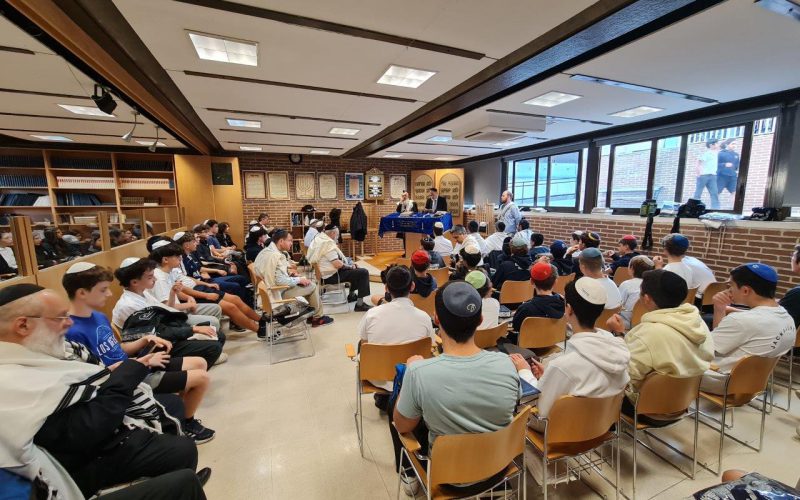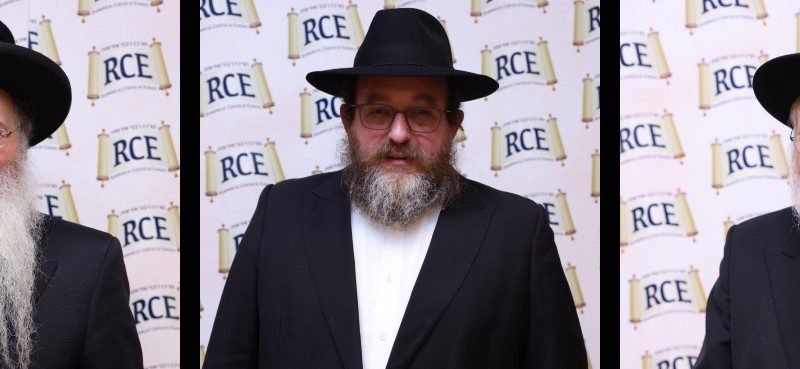Investment of Tens of Millions of Shekels to Ensure Kosher Jewish Weddings

The Ministry of Religious Affairs is launching a global marriage registration system so that Rabbis from around the world can share the information about marriage contracts they have and check with each other – thus preventing duplicate marriages and other problems that are currently occurring in the absence of such a system.Rabbi Yechezkel Samin, director of the marriage department at the Ministry of Religious Services, announced this at the Conference of European Rabbis in Italy in the month of Adar.
The registration will be done with the help of the new computerized marriage registration system – “Shirat HaYam”, a national computerized system that connects and consolidates all marriage registration bureaus into one program and arranges the registration for a marriage according to the Ministry’s guidelines and the procedures of the Chief Rabbinate of Israel.
For Rabbis around the world, the new information is welcomed but arouses concern. The Rabbis agree that such a system would help rabbis around the world – but they also very wary.
The RCE has been striving to establish this data in Europefor the past ten years. This program will check the status of anyone who wants to marry. Rabbi Yaakov David Shmahl a member of the RCE board of directors of said “It will certainly help.”
In the United States, there are also those who are preparing to establish a similar and even more advanced system for it, with the aim of avoiding all the problems involved in marriage registration. For example, the Rabbis of the Bukharin community, led by Rabbi Yitzchak Yisraeli, established such a system last year in order to prevent serious marital problems. Such a global system, they agree, could be beneficial.
“Such a system can solve many problems,” notes Rabbi Avraham Dayan, Deputy Chief Rabbi of Venice. “It can bring communities together, and can also help in complicated cases, for example,” he gives an example that has occurred to rabbis around the world. “When a couple comes to marry and it becomes clear through this system that the man is a married man who ran away from his wife and left her an Aguna and now, when he has gone elsewhere, he wants to marry – Obviously he will not be able to remarry before getting a divorce certificate. Unfortunately, there were cases like this here in Italy, not necessarily in the case of marriage, that people falsified all kinds of certificates or deceived rabbis and ultimately needed a Get Lechumra. ”
Rabbi Shlomo Bistritzky, the Rabbi of Hamburg , Germany, also wholeheartedly welcomed the move. “This is a special thing that will provide a solution for inquiries and benefits,” he says, immediately after the conference, he and another rabbi from Hamburg were already using the “Shirat Hayam” system to resolve doubts about a particular person concerning an issue they were treating.
“This is just information,” explains the Rabbi Yaakov David Schmahl. “TheUltra-t Orthodox will also join, as whoever has responsibility to the public, I think, must join in helping other rabbis.”
But alongside the positive reactions, Rabbis in both Europe and the United States raised concerns and criticisms of the system’s efficiency. One of the concerns expressed was the fear that the possibility of registering a couple in the system would be ‘recognition’ even for those who are not necessarily ‘kosher’ rabbis. Another concern was the fact that the rabbinate does not know all the rabbis of the world and has no authority to decide who is worthy of the title of Rabbi and who is not, this is besides the concern that the system would constitute an indirect way of the Chief Rabbinate of Israel to try and “control” the rabbis of the world, unjustly.
In a conversation with Rabbi Samin, he refutes these concerns one by one, and makes it clear: The system is not recognition, nor is it operated by the rabbinate, but merely used for information. The Ministry of Religious Services will operate the system.
Rabbi Samin relates to the history of the system: “Since I entered the job about seven years ago, I have realized that everything that is done here in Israel would not be complete unless Jews in the Diaspora were also included. We are one body of people and the common denominator that connects us is marriage. I made a plan but it was problematic because until recently we didn’t have our data. Until about six months ago, if I wanted to know what a person’s status I’d have to go to the interior Ministry. They were the only source of information I was so upset – we had nothing of our own.
“In reality,” Rabbi Samin adds, “|The Rabbi that adds the marriage, does indeed check whether it is written in the Interior Ministry and they are Jews – but our database was not even on the Jews here, in the country.”
In the end, Rabbi Samin says, almost four years ago, the actual ‘Sehirat HaYam’ programming began, tens of millions of shekels were invested in the program, an amount that includes the high security to protect the privacy of all who are registered there.
“Today we have our reservoir,” he said. “If you want to know where a man got married, then we have all the documents. The program regulates marriage registration in all religious councils. After the procedures have been defined, all married Jews in Israel are in the database of the Ministry of Religious Services, and the plan can now be implemented: We offer to all the Rabbis that marry couples according to the Jewish orthodox :Come and connect to the software. Here in Israel we have almost fifty percent of the world’s Jews, with information on the status of every person who is married in Israel, all in one program that includes 150 marriage registries across the country. ”
Rabbi Samin mentions that there are no religious councils abroad, and the data input is done by every Rabbi that marries off couples. While in some places, such as Paris, there is a local record, but not all rabbis participate. Now it is proposed to all rabbis of the world – which is estimated to be about 5,000 – to get a code and password and log in to the system. Thus, when a couple comes to sign up, with the help of a multi-software connection, he can know if one of them appears in the system, which means he was previously married.
Rabbi Samin emphasizes that “We do not get into the question of how you find out about Judaism; this is the place of a Mara Diatra everywhere. The system only asks that you check if there is identification for one of the partners in the system, identifying what it means to marry in the past. For example: If the system says the woman married 5 years ago in Hong Kong, the rabbi would have to make sure she had a divorce. ”
The next step on the part of the rabbi is after marriage, when he is asked to enter into the global database the details that the couple is married so that in the future which one of them wants to marry again – he or she will have to divorce with a proper get.
Because religious marriage abroad is not official and the couple everywhere is registered as married in the civil system, it is possible to divorce a civilian and want to remarry without record. Those who lack Jewish knowledge of the need a get for a divorce may go to another country and try to remarry. “I want to prevent such a double marriage,” Samin declares. “There is a law against bigamy in Israel – and I want to prevent it.”
Thus, the marriage registrar will also benefit from the system that allows him to make sure that the couple was not married in the past, and will also ensure that they are properly separated in the future if needed.
Samin reassures fears in all directions as questions were raised by the Rabbis. On the one hand, he emphasizes, the system will not be a confirmation of the marriage entered into it, but rather a registration of it, so that other rabbis, in due course, can test their truth. “A Rabbi, who wants to connect, even if it is about what the rabbinate says he does not trust, still wants to know who the couple is that he is marrying, because if the marriage is not completely kosher, someone needs a divorce. We are the Ministry of Religious Services – and not the rabbinate, so our system also does not constitute recognition of the rabbinate. The responsibility for the data is on those who feed it.
Rabbis who log- in to the system will be asked to give a kind of resume. Where have they studied? Who are their Rabbis? Who are also their students? Etc. This way, someday, when we want to check on a particular couple who is getting married – we can tell who registered them. All the resumes are for information purposes only, this is not a responsibility for the validity of their marriage, but a record so a person who is married – no matter who – will not marry a second without a divorce from the rabbinical court.
“I have the blessing of the Chief Rabbis. I consult with Rabbi David Lau. Things were done in full consultation with him, and when I presented the program in Italy at the Conference of European Rabbis at the end of the month of Adar, Rabbi Yitzhak Yosef congratulated me for this.
Rabbi Samin presents another aspect of the system: “Today there are many men who have refused to give a get and made their wives Agunas. The courts have people with connections who take money to locate the runaways. It’s a tough procedure that costs a lot. Through this data, there will be thousands of colleagues around the world, and when one leaves his wife and appears anywhere, we will immediately locate him through the 5,000-peer network, enabling us to send his picture and details with clear instructions on how to behave (such as ostracism, non-attachment, Prohibition of doing business with him and the like).
I don’t give instructions to rabbis, just give you data. When you decide that they are fit to marry, input their data for their benefit and for all of Israel’s benefit – the couple wants to be in the global reservoir. ”
Rabbi Samin emphasizes that everything was left to the rabbis’ decision – so even the addresses are not scanned but only the information about the marriage. However, you can get from the Religious Services Office, free of charge, file management software, so that they can easily manage the files with the documents – when the documents remain with him and in the future, when asked to retrieve, they can easily do so. This is software that will not be linked to global data, to the benefit of the only rabbis that marry off couples.
Another important aspect is the security of the system. Rabbi Samin notes: “When a Rabbi joins the system, he will only see if one of the spouses is recognized in the system. To find out, he will need to contact us and we will check, but for information security reasons we will not be able to give everyone access to the software. You just have to identify one of the partners in the system, which would indicate if he or she was married.
We do not want to be the “big brother” who is always ‘watching you’ “He emphasizes, “Anyone can be registered without the fear of being followed. The main thing is to record the marriage for the future of Israel. ”


